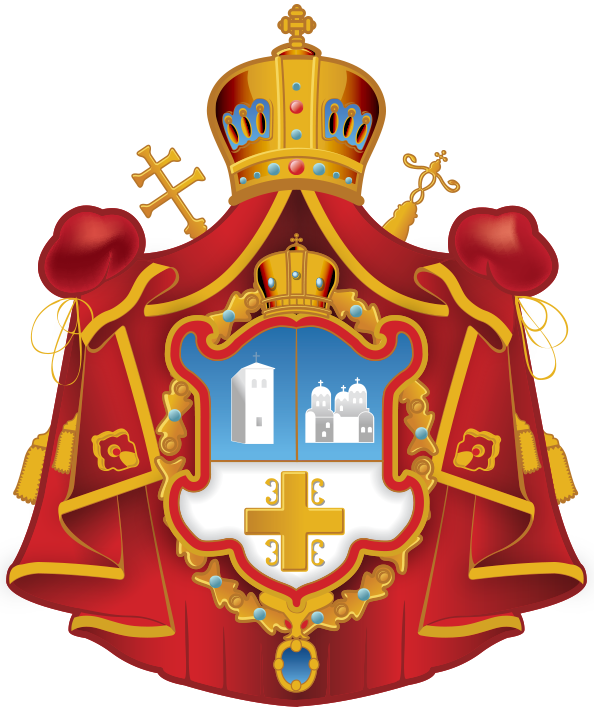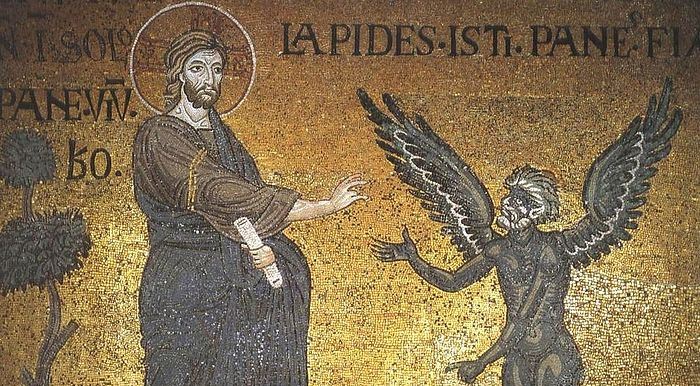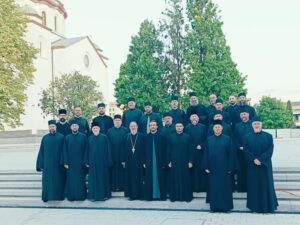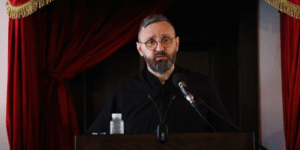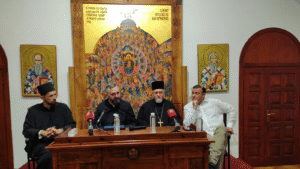We continue with the interpretation of verses 8 and 9:
Saint John Chrysostom teaches that Satan deliberately reserved this temptation—earthly power and the desire for wealth—for the very end, as the most powerful of all. Here are his words:
“In reality, the source of countless evils lies in these three vices: indulgence of the belly, vainglory, and an intense attachment to wealth. Knowing this, the vile tempter saved his strongest weapon, the desire for more, for the final assault. His painful longing to present this temptation was present from the very beginning; yet, being more potent than the others, the devil kept it for the end. Such is the rule of his battle: to use last what he believes will most easily overthrow his opponent. Thus he did with Job, and thus he does here…
How should the devil be defeated? As Christ taught: by turning to God, not falling into despair even in hunger, trusting in the One who can feed us with a word; and if we receive good things, not to tempt the Giver, not to care for human praise, but to be satisfied only with heavenly glory. Truly, nothing submits us to Satan’s dominion more than the desire for more and the love of possession.”
Saint Justin of Ćelije draws our attention to the fact that the devil here falsifies reality, since he does not rule the world. The Saint writes:
“In this world, the devil is a usurper, for he has declared himself the owner of another’s property. Indeed, the evil and sin in the world are his, but the world itself is not his—it is God’s, for it is God’s creation.”
Now we turn to verse 10:
Then Jesus said to him: Get thee hence, Satan, for it is written: Thou shalt worship the Lord thy God, and Him only shalt thou serve.
Saint John Chrysostom explains the Lord’s response in this way:
“Since the devil now sins against God the Father, calling the universe that belongs to the Father his own and daring to present himself as God—as though he were the Creator—Christ finally rebukes him. Yet even here, without wrath, He simply says: ‘Get thee hence, Satan.’”
The Fathers also teach that by the words “Get thee hence, Satan,” the Lord ends all further temptations from the devil. Saint Hilary of Poitiers writes:
“When the devil heard the name Satan, which exposed his transgressions, he recognized in the man Jesus his Lord and God, before whom he must bow. By this response, the Lord gave us a magnificent example: that by despising earthly glory and rejecting the desire for worldly possessions, we must remember to worship only God and the Lord—especially now, when veneration of the devil has become commonplace in our age.”
Saint Justin of Ćelije reveals the true and essential meaning of human life:
“Knowing the hidden intent of the Tempter, the Lord Jesus answered him and said: ‘Get thee hence, Satan, for it is written: Thou shalt worship the Lord thy God, and Him only shalt thou serve.’ The true life of human beings in the world consists in worshiping and serving God alone, the one true God.
Humans are created in the image of God, that their whole soul may be drawn to Him, and that their entire life might be continuous divine worship. People are immortal beings, for they possess an immortal soul. Only by serving the immortal and living God, and living by Him, do they fulfill their divine purpose in the world: they conquer sin and death and attain everlasting and immortal life.
The God-Man came into the world to give humanity divine powers and strength to be freed from sin and death and to become holy and immortal. That is the kingdom, the power, and the glory of the God-Man—and of man as well. For man’s true kingdom, power, and glory lie in becoming and remaining a God-Man: holy and immortal. Everything else is man’s shame and disgrace.”
Then the devil left Him, and behold, angels came and ministered to Him.
Saint John Chrysostom offers an excellent interpretation of these words, demonstrating that Christ’s solitude was by no means accidental—that He deliberately wished, as a man, to confront Satan alone. Saint John writes:
“During the struggle, Christ did not allow the angels to appear so as not to drive away the one who needed to be captured. But when He had exposed the devil in all things and compelled him to flee, then the angels appeared. From this we should understand that after you, too, have overcome the devil, angels will receive you with applause and will protect you in all circumstances. Thus also they received Lazarus and carried him to the bosom of Abraham, who was tried in the furnace of poverty, hunger, and various afflictions. Christ, as I have said before, revealed here many things that are meant to occur with us as well.”
The Tradition of the Church teaches that at every moment two spiritual beings are near each person: a guardian angel and a demon who seeks to trip us and draw us away from God—if we ourselves consent to his suggestions. It sometimes happens, by divine allowance, that our guardian angel withdraws from us, giving us the opportunity to engage in spiritual battle with the evil spirit. Yet even in such a struggle, we are never truly alone; the angel remains near, and God’s grace is still with us. This spiritual combat is necessary to manifest our free will—our soul must be given the chance to reveal to which side it will align itself. Saint Seraphim of Sarov explains:
“Just as wax that is not warmed and softened cannot receive a seal, so too the soul that has not been tested by ascetic struggle and suffering cannot receive upon itself the seal of divine virtues. When the devil left the Lord, the angels came and ministered unto Him. Therefore, if during times of temptation the angels of God appear to withdraw from us, they remain close by and quickly return to minister to us through divine thoughts, compunction, and patience. The soul that exerts itself acquires other perfections as well.”
Saint Gregory the Dialogist draws from these verses a dogmatic affirmation of Orthodox Christology: that the Lord Jesus Christ is truly God and truly Man, possessing two natures in one Person. He writes:
“It is significant that after the devil had departed, the angels ministered to Him. What is revealed in this event, if not the two natures in the one Person? For He is indeed a man, being tempted by the devil; yet He is also God, served by angels. Thus we recognize in Him our human nature, for had the devil not seen a man in Him, he would not have dared to tempt Him. And we venerate in Him the Divinity, for had He not been God above all, the angels would not have ministered to Him.”
Saint Luke of Crimea draws our attention to the fact that, although the devil departed, it was only temporarily, as the Gospel of Luke affirms: “And when the devil had ended all the temptation, he departed from Him for a season” (Lk. 4:13). Saint Luke reflects:
“The devil, like a beaten dog, went away. But why, then, does the Evangelist Luke say that he left Christ only ‘for a time’? How so, for a time? Do you not know how many sufferings, how many temptations from evil scribes, high priests, and Pharisees, instructed by Satan, Christ endured? Satan did not leave Christ alone even when He was praying with bloody tears in the Garden of Gethsemane, when His soul trembled before the coming Passion—not even then did Satan cease to afflict Him. The Lord overcame all temptations: after His forty-day fast, He shamed the devil and withstood all trials with ease.
‘Then the devil left Him, and behold, angels came and ministered to Him.’ This is the summit. It is the radiant conclusion of Jesus’ ascetic labor in the wilderness: the angels came, bowed before Him, surrounded Him in great number, and began to minister to Him.
Let me add a few more words. Satan tempted the Lord Jesus Christ. Satan and his angels also tempt all of us, and we all must struggle with these temptations. Looking to the example of the Lord Jesus, we should reject every temptation by the words of Holy Scripture. And if we succeed in fulfilling this difficult task, if we overcome all temptation, the same will happen to us as happened to the Lord Jesus: angels will appear, bow before us, and minister to us. Let us strive to be worthy of such honor from the angels!”
Adapted and arranged for the contemporary reader according to Patristic interpretations by Stanoje Stanković.
